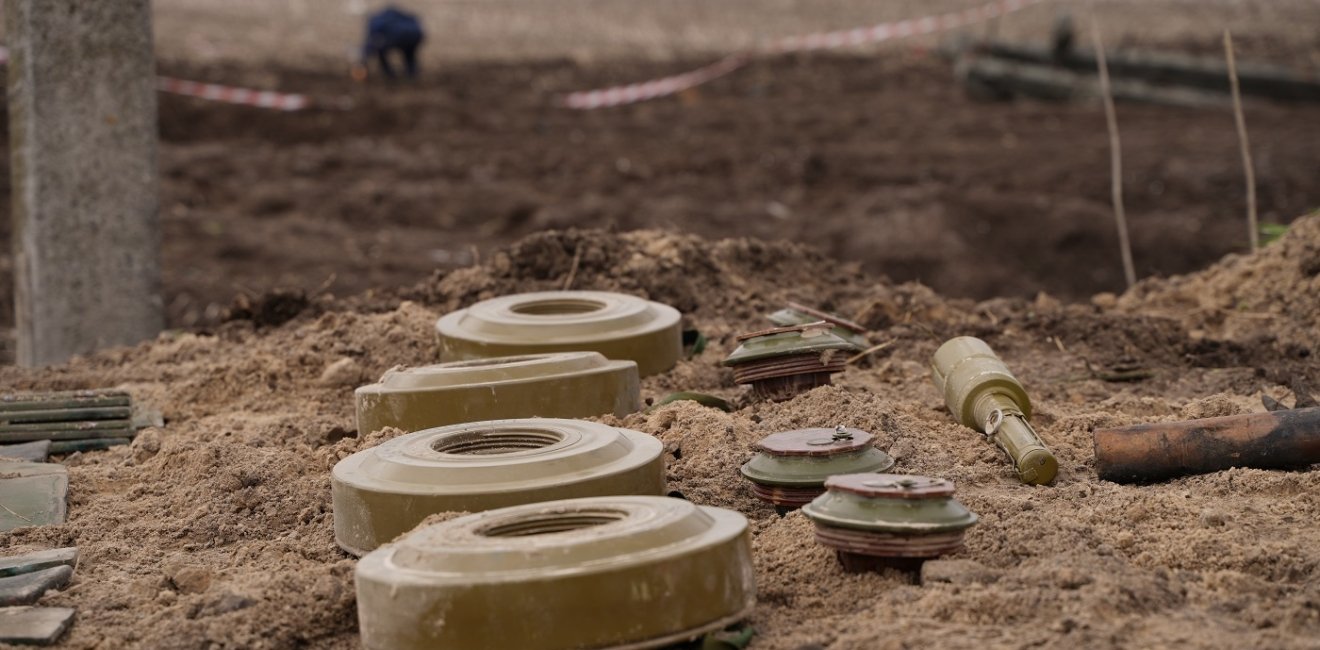
A blog of the Kennan Institute
The past two years of the Russian invasion have resulted in the mining of more than 174,000 square kilometers of Ukrainian territory, or more than 28 percent of the country. The World Bank estimates the total cost of demining at $37 billion. This situation presents the United States, Ukraine’s biggest supporter in the latter’s fight against Russia, with a new direction for development aid and an emerging market with significant business opportunities.
U.S. Commitments, Ukraine’s Needs
Since the beginning of the full-scale invasion, the United States has committed more than $113 billion in emergency funding to support Ukraine. Funding for demining accounts for only a small part of this, however, with $95 million provided in July 2023, on top of the $228 million allocated in the Additional Ukraine Supplemental Appropriations Act of 2022.
While demining a territory larger than Greece requires significant financial resources, the most effective use of the funding is to facilitate a robust private demining market. The main obstacle to the functioning of a demining market now is the high cost of demining operations, which exceeds the value of the land itself. According to the Kyiv School of Economics, the cost of examining a parcel of land can reach more than $3,000 per hectare and the cost of machine demining more than $30,000 per hectare. As a result, small and medium-size farms cannot afford demining, while state services are directed toward demining cities and communal infrastructure projects, with limited resources allocated to farms.
With such extensive areas being mined, Ukraine has lost significant agricultural capacities. In 2021, prior to the invasion, agriculture alone accounted for 41 percent of Ukrainian exports. With the blanket mining of agricultural lands, Ukraine has lost not only exports and related tax revenues but also a crucial employment sector for its population.
A Pilot Program
One of the ideas heavily favored by Ukrainian demining operators is the creation of a donor-supported scheme to reimburse part of the costs paid by local farmers for demining. This approach would allow Ukrainian demining operators to gain on-the-ground experience, train personnel, and upskill, while providing marketlike services to Ukrainian farmers.
The Ukrainian government has already launched a state compensation program with a modest $75 million—a drop in the bucket compared to the World Bank’s estimate of $37 billion needed. Ukraine’s program does, however, offer proof of concept and assurance to its partners that development aid to demine Ukraine would be allocated efficiently.
A New Frontier for U.S. Tech Companies
Apart from the humanitarian dimension, there are substantial business opportunities for U.S. defense and military businesses in Ukraine, now the world’s largest demining market. The recent unification and simplification of certification rules for demining operators is expected to do away with certain barriers to entry into this market. The need for new private and flexible operators is significant, as demonstrated by Ukrainian companies diversifying into demining from other sectors, such as security and agriculture.
With access to U.S.-trained officers experienced in operating in conflict zones and with easier access to U.S. development finance, American companies could expand into demining operations in Ukraine. These efforts could start with less complicated activities, such as civilian information campaigns or technical land surveys.
All types of demining activities, whether demining operations themselves or technical surveys conducted using drones, require substantial amounts of equipment, both hardware and software. Several international demining leaders, including the Switzerland-headquartered GSC (Global Clearance Solutions) and the Zagreb-headquartered DOK-ING, with expertise in robotic and autonomous systems, have localized equipment production in Ukraine, gaining access to local clients and providing employment opportunities for local communities. There is a significant need for affordable and modern vehicles such as demining equipment itself, as well as smaller drones and software, including AI-based applications, to facilitate land surveys and mine clearance.
U.S. companies and financial institutions could also participate in Ukraine's burgeoning military tech sector. Ukrainian military startups offer war-tested technologies and lucrative investment returns. Some U.S. venture capital funds are beginning to invest in the Ukrainian market, but the opportunity remains vast. In the long term, Ukrainian demining and military-related startups could potentially supply products to other regions, expanding the market scope and potential revenues.
The need for demining in Ukraine is immense, but so are the opportunities. Through development aid and strategic business investments, the United States can play a crucial role in helping Ukraine clear its land of mines while also opening up a new frontier for American enterprises in the defense and technology sectors.
The opinions expressed in this article are those solely of the author and do not reflect the views of the Kennan Institute.
Author


Kennan Institute
The Kennan Institute is the premier US center for advanced research on Eurasia and the oldest and largest regional program at the Woodrow Wilson International Center for Scholars. The Kennan Institute is committed to improving American understanding of Russia, Ukraine, Central Asia, the South Caucasus, and the surrounding region through research and exchange. Read more

Explore More in Focus Ukraine
Browse Focus Ukraine
Talking to the Dead to Heal the Living

Ukrainian Issue in Polish Elections


